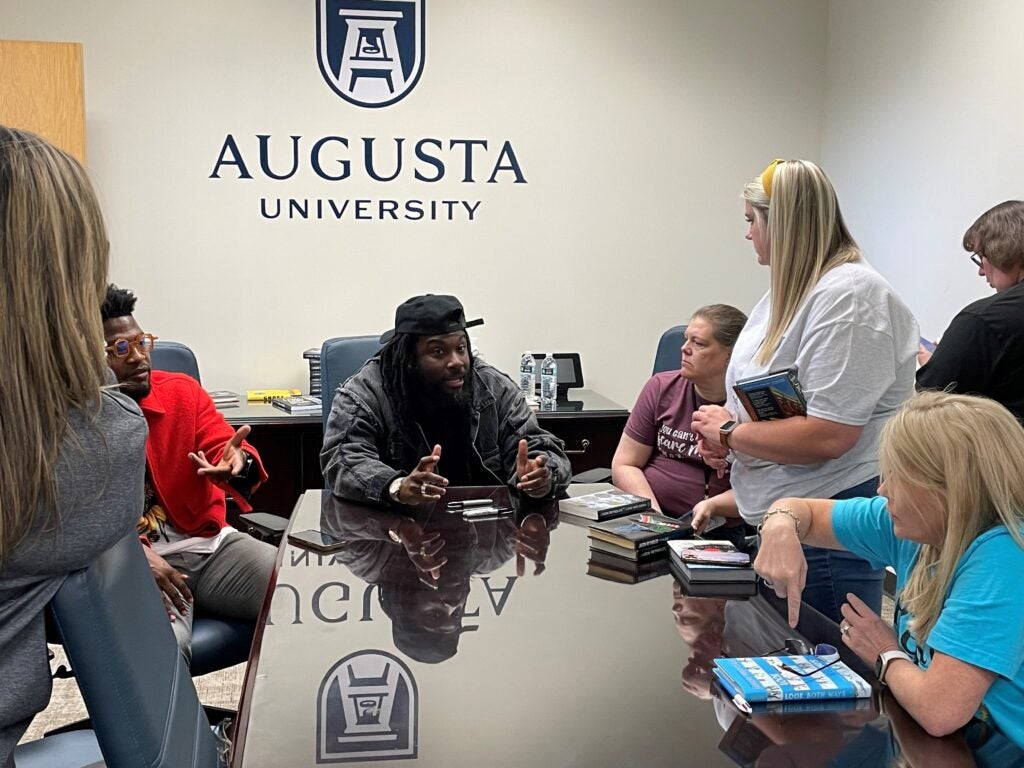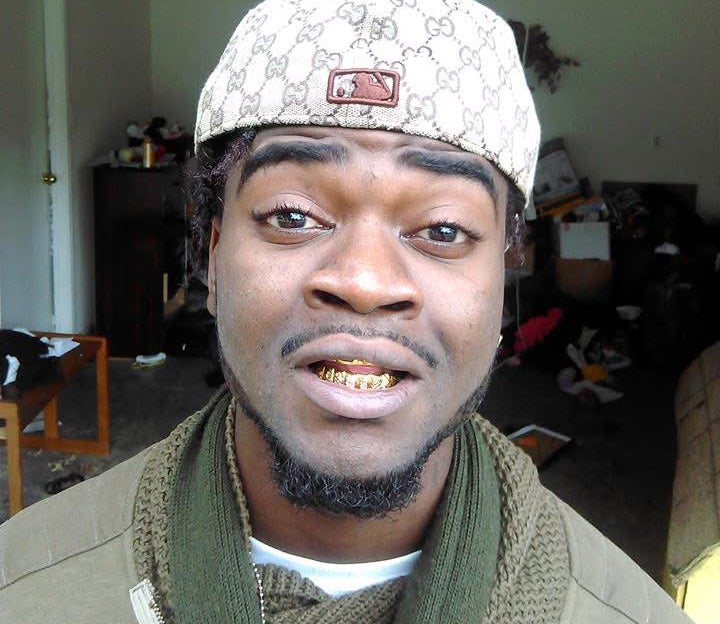On Saturday afternoon, at the Roscoe Williams Ballroom at Augusta University, New York Times bestselling author Jason Reynolds spoke before an eager crowd of educators, academics, students and literature enthusiasts about his own struggles, passions and inspirations about the art and craft of writing.
“You want to be a good writer, get to know yourself,” said Reynolds “The better you know you, the better your work will be. That’s the hardest part of the job.”
The Washington, D.C.-based young adult novelist was the keynote speaker at the National Writing Project in the South Conference, an annual, regional symposium of seminars and discussions about teaching, writing and literacy. While the AU Writing Project had participated in the conference before, this was its first time hosting.
Associate language and literacy professor Rebecca Harper, who directs the AU Writing Project, had established a rapport with Reynolds last year, when the author gave a virtual presentation as part of the School of Education’s Writing Project Author Series.
“I met him a long time ago at a conference, before he had written as many books as he has now,” Harper said. “He’s been a favorite of the teachers that I work with in our project. And so I knew that for me, the ultimate goal for our writing project was to get him here.”
Reynolds’ presentation on being a writer began as a familial recontouring of his upbringing in Oxon Hill, Md., close to the border of Washington, D.C., in the late 80’s and early 90’s. He relayed his experience in images ranging from buying packs of ramen noodles by the tens for dinner and snacks, chasing ice cream trucks, making Kool-Aid with entire bags of sugar and having block parties; to watching friends, neighbors and relatives succumb in various ways to the burgeoning crack cocaine epidemic.
“You take that kid, with the block parties, peanut butter, ramen noodles and Kool-Aid, with gangsters and hustlers and addicts, and you drop him down in the classroom, and a well-meaning teacher looks at that kid and says, ‘I want you to read this story about this man in a boat, chasing a whale,’” said Reynolds, telling the story of his winding journey toward embracing literature, beginning at a time when, he admits, he just didn’t read books. “It seems kind of silly when you put it all in context.”
As a child, Reynolds said, he found the books he was being assigned to read—both the language and the stories—both boring and, more importantly, unrelatable. He would find a loophole into appreciating literary craft, however: rap music.

At nine, he said, he had scrounged up enough money to buy a cassette tape of the album “Black Reign” by Queen Latifah. Reading the liner notes while listening to the music, Reynolds realized he was reading poetry.
The discovery inspired him to write his own poems, which he went on to do for years, through high school and college. A love of reading, alongside his love of creating poetry, wouldn’t develop until college, when a professor teaching an African American history course challenged his attitude about what reading is meant for.
“The mere act of reading will teach you concentration, discipline, patience, persistence,” Reynolds said. “It will teach you how to listen to yourself, because it’s not the writer’s voice you hear, it’s yours. And it’ll keep your imagination stoked, which is the most valuable thing you will ever have.”
Reynolds would go on to read, and appreciate, those classics he had been told to read years before, understanding the possibilities of language and how to use it to relate to any reader. Talking about his initial dismissal of the works of Shakespeare, and discomfort with their language, he mentioned the plays “Macbeth” and “King Lear” as among his favorites, comparing them to contemporary TV series like “Power.”
Reynolds began to gear his writing toward prose fiction more than poetry, drawing from his experiences. Stories of trouble Reynolds and his brother would get up to in their neighborhood became his 2014 debut novel “When I Was the Greatest,” which won the Coretta Scott King Award for New Talent. He drew on the grief of losing family and friends at a young age to write “The Boy in the Black Suit,” published in 2016.
Reynolds is also now himself a professor, teaching creative writing at Lesley University in Cambridge, Mass.
“I wonder what it would be like if you spent a lot of time trying to be, so tell your stories,” said Reynolds, paraphrasing words of encouragement from Christopher Meyers—son of the late young adult author Walter Dean Myers—who convinced him to not abandon his writing career during a rough patch in his mid-20’s. “Find your voice, your style, your flavor, break all the rules. Just do your thing, trust your intuition. That same attitude you’ve got for all these teachers, the same attitudes you got for all the adults in the neighborhood, that says, ‘You can’t tell me nothing!’—let’s see it. Put it on a page.”
Skyler Q. Andrews is a staff reporter covering business for The Augusta Press. Reach him at skyler@theaugustapress.com.










